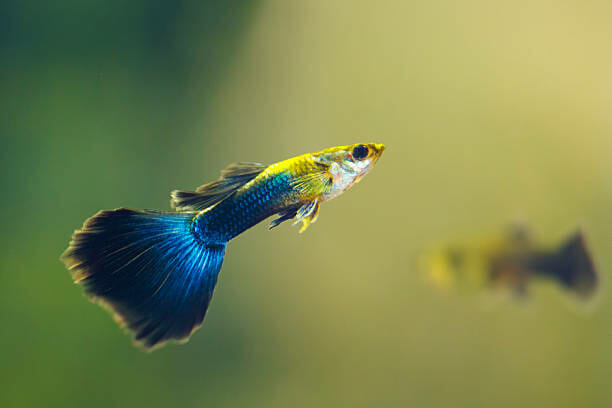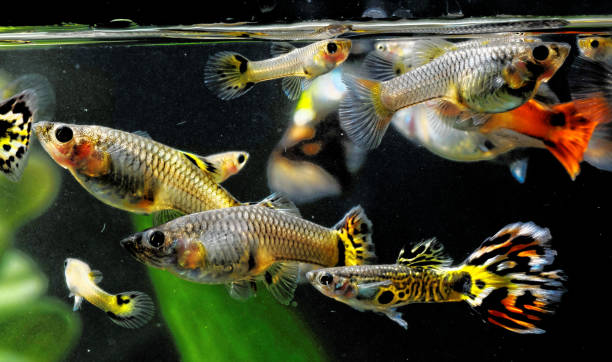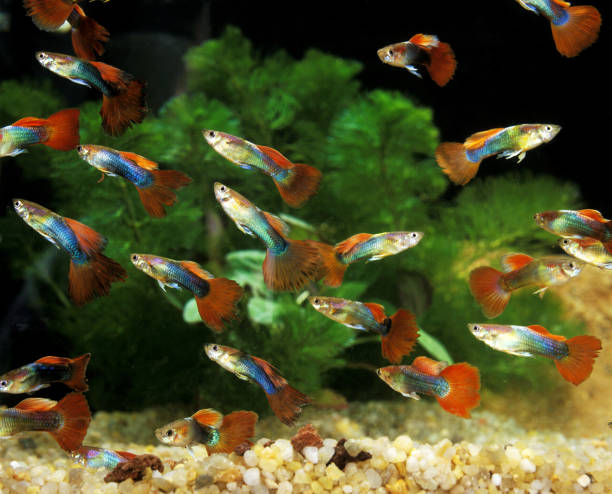How Big Do Guppy Fish Get: Tips to Grow Guppies Faster
Guppy fish is a popular aquarium fish. Guppy fish are easy to care for and are fairly easy to feed. They are also relatively low maintenance, requiring only occasional water changes and a small amount of food.
Guppy fish can get up to 2.4 inches in length, but the average size is about one and a half inches. These fish are native to Southeast Asia and can be found in fresh water and brackish water habitats. Guppy fish are voracious eaters and will consume a wide variety of aquatic prey, including small fish, crustaceans, and even insects.

Table of Contents
Size Differences Between Male and Female Guppies
Female guppies are significantly bigger than the males, the former growing up to 2.4 inches while the latter just growing below the average size of 1.5 inches. Guppies are sexually dimorphic, meaning that the sexes have different physical features. Guppy fish is usually a light green on the back with black splotches and they have a V-shaped dorsal fin. The male guppy has larger fins and is generally brighter in color than the female. Female guppies also tend to be slightly rounded in shape than their male counterparts.
When Do Guppies Reach Their Maximum Size?
Guppies do not reach their maximum size until they are six months old. During this time, the fish will start to grow noticeably in length and weight. In addition, the guppies will start to develop mating colors which are initially white, developing into orange, and then finally a vibrant green. Females will also grow larger than males at the same age.

How to Speed Up Guppy’s Growth?
If you’re looking to speed up the growth of your guppy fish, there are a few things you can do. First, make sure the tank is large enough for your guppy to swim around in. Second, provide them with plenty of food and water. Third, be sure to keep an eye on your guppy’s health and make sure they’re getting the proper amount of exercise. Finally, be patient – guppies take a while to grow into their full size. Other important practices that you can do to speed up your guppies’ growth include:
Spacious Aquarium
Guppies are popular pet fish and can be found in many pet stores. They are small fish, typically less than 2 inches long, and require a small tank. Some people keep guppies in a bowl, but they are not happy and will not thrive. A guppy tank should be no more than 10 gallons and should have plenty of plants and rocks to hide under.
Healthy Diet
A guppy diet should consist of fresh vegetables and fruits, pellets, flakes or tablets, and small amounts of live food. A balanced diet will allow your guppy to grow larger without becoming overweight or unhealthy.
Swimming Activity
Guppies love to swim so make sure they have plenty of room to play in their tank. Give them a floating piece of wood or an old plastic container to explore and play in. Also, provide them with a small bowl of water to swim in and watch them zip around.
Water Parameters
Guppies need a lot of water to live, so it is important to keep their water parameters in check. If their water is too hot or cold or has too much or too little dissolved oxygen, they will not be able to survive.
Appropriate Light
Artificial light can have negative impacts on fish populations. Many fish species are sensitive to light and can experience health problems when exposed to artificial light at night or during the day. Some fish species, such as guppies, can grow very large under artificial light, which can impact their natural habitat and ecosystem. Appropriate artificial light should be used to maintain healthy fish populations while minimizing negative impacts.
Separate Baby Guppies
Raising fry in a separate container from adult fish can help to ensure that they reach their full potential as fish. By raising fry in a separate container, you can more easily monitor their growth and adjust their feeding and water conditions accordingly. Many people believe that raising fry separately is best for their development. This is because it allows for more independence and better learning skills. Some people also believe that this will make the fish healthier.
Separate Fry by Size
When raising fry, it is important to separate them by size so that they are not competing for food and water. Young fry needs more food and water than adult fish, so it is important to provide enough for all of them without overfeeding or underfeeding any one individual.
Provide Enough Sunlight
The guppy fish needs sunlight to survive. Guppies need at least six to ten hours of direct sunlight a day. If they don’t get enough sunlight, they may develop tumors or die. Guppies, for example, need light to produce their digestive enzymes and reproductive hormones. It is important to provide them with enough sunlight so that they can thrive and breed properly.
Be Patient
Guppies take a long time to grow into their adult size – typically 6 months. So be patient and you will see your guppy fish become larger over time.
How to Breed Guppies for Size?
Many people ask how to breed guppies for size, as they want to raise a large fish. Guppies can grow up to three inches long, but the average size is about one and a half inches. To increase the chances of getting a large fish, you will need to start with smaller fish and breed them with larger ones.

Common Reasons Why Guppies Stop Growing
Guppies can reach a maximum size of three inches, but the average size is about one and a half inches. Some common reasons why guppies stop growing are that they become overcrowded, they are not getting the nutrition they need, or they are not getting enough sunlight. If guppies are not growing, it is important to take them to a veterinarian or a fish specialist to get them checked out and possibly treated.
- Aquarium Space: One of the most common reasons guppies stop growing is that they become overcrowded in their aquarium. If you have more guppies than space allows, it is important to move some of them to a larger tank or adjust the size of your aquarium so that there are enough spaces for all the fish.
- Nutrition: Guppy fish need a high-quality diet to grow and thrive. Make sure that you are providing your guppies with a diverse diet that contains plenty of fresh water and food items. Guppies need a high-quality diet to grow and thrive. Make sure that you are providing your guppies with a diverse diet that contains plenty of fresh water and food items.
- Water Parameters: Guppies need clean, fresh water to stay healthy and grow. Make sure that the water your guppies are living in is of adequate quality by testing the pH, hardness, and temperature every week. It is also important to provide them with plenty of sunlight so that they can get their necessary vitamin D from the sun.
- Overpopulation: If your guppy is living in an overcrowded tank, it is important to move some of them to a larger tank or adjust the size of your aquarium so that there are enough spaces for all the fish.
- Genetics: It is sometimes difficult for guppies to grow larger than their average size. If your guppy parents are smaller than average, likely, your guppy offspring will also be small.
- Poor Water Quality: The lack of water changes can have a drastic effect on the size of guppy fish. Without a regular supply of freshwater, guppy fish can grow to be up to three times their original size. This is because guppy fish rely on water to regulate their body temperature, maintain their organs, and clean their skin.